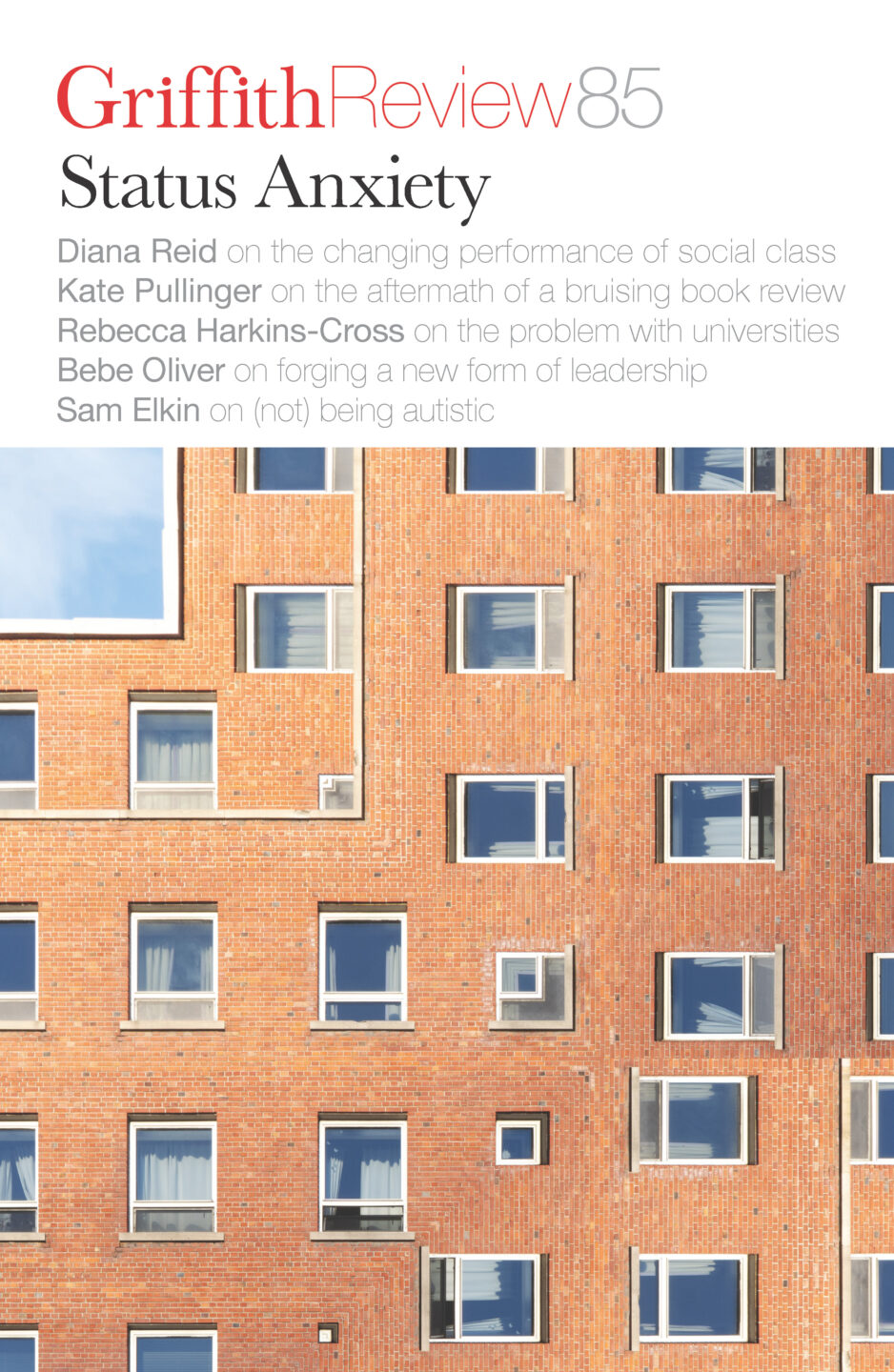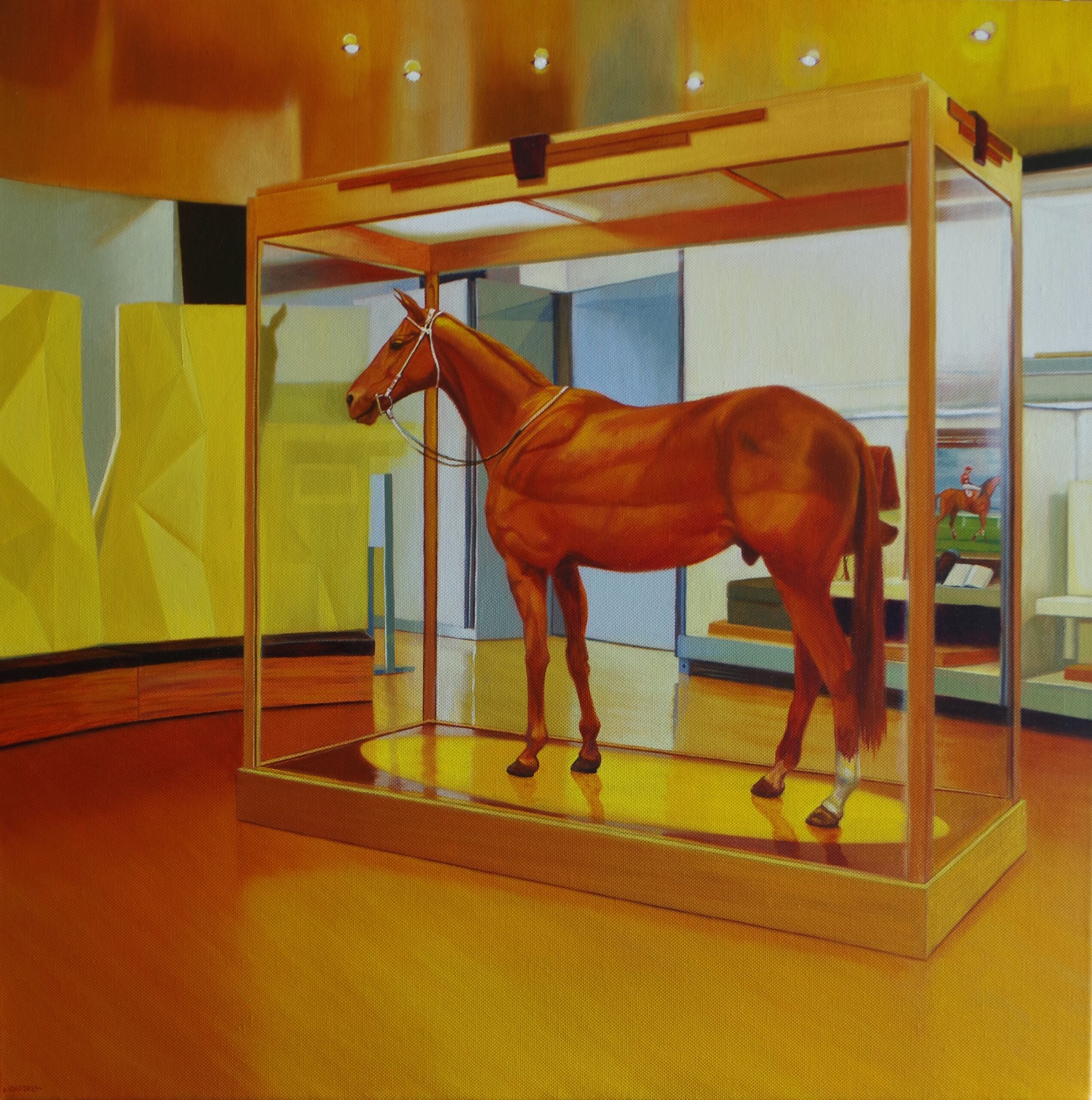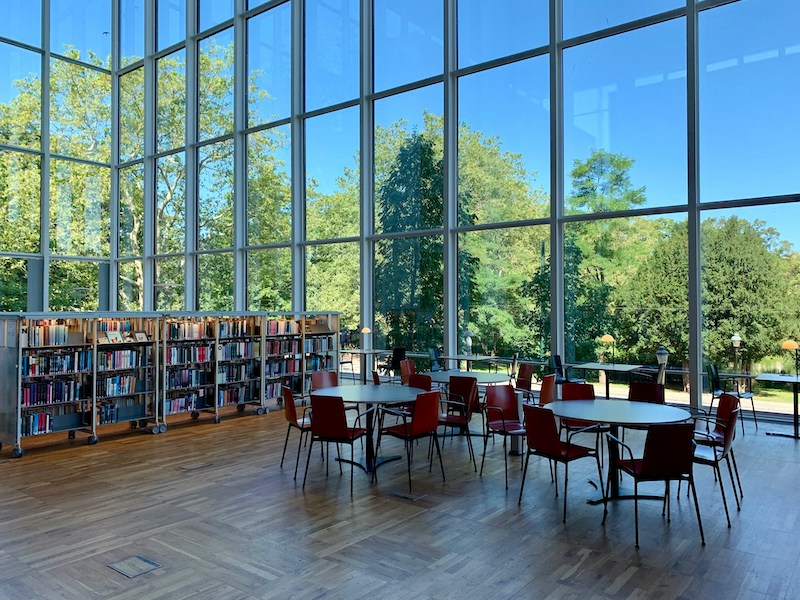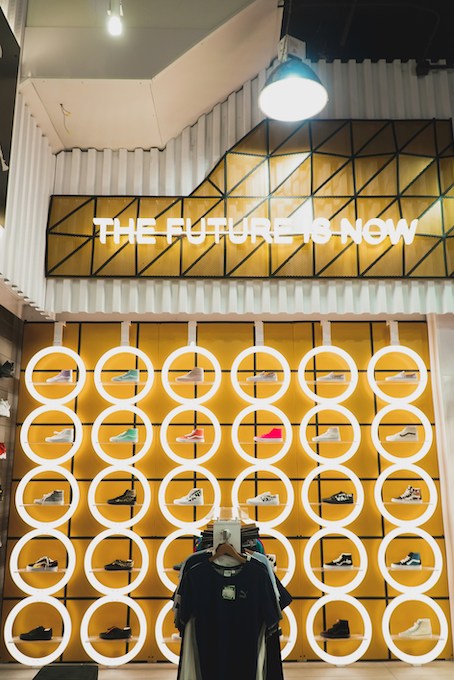Featured in

- Published 20240806
- ISBN: 978-1-922212-98-6
- Extent: 216pp
- Paperback, ePUB, PDF

THINKING ABOUT STATUS reminds me of that faintly threatening riddle about the future: I am always in front of you, but you will never see me. Status itself is a little like a riddle: a code to be cracked, a hand in which you can’t see all the cards. Unless you’re Batman, however, the stakes for solving riddles tend to be comfortingly low, whereas the pressures of deciphering status can occupy a far more consequential role in our lives (it’s all fun and games until somebody loses their cultural capital). It’s also easiest to define status according to what it isn’t: gender, race, class, job, accent or postcode, although all these elements circulate in its DNA.
This shapeshifting quality is surely why status today increasingly seems the wrong way around, or like the punchline to a bad joke: the well-off dress down (but at high prices), the political right is winning the working-class vote, the left is charged with intellectual and cultural elitism, buying a one-bedroom flat is a sign of intergenerational wealth, and having zero free time is now a curious way to win prestige – the rich and important are idle no more. Then there are the insidious ways in which status, like an invisible yet insistent hand at the small of your back, pushes you into or away from particular social and professional circles where seemingly innocent questions – about what you do, where you’re really from and where you went to school – cast looming shadow puppets of double meaning.
Status isn’t always negative, of course. Accrue the right kind, and its gifts can be manifold. Would it be any easier to parse if we could say the quiet parts out loud – if we could just ask and answer the question so memorably put by the Spice Girls back in 1996: who do you think you are?
THIS EDITION OF Griffith Review is unlikely to resolve your status anxiety, if you’re so afflicted. But its essays, short fiction, conversations, poems and visual art seek to make status and its attendant frustrations, iniquities and (occasional) pleasures a little more visible. It surveys the ways in which status plays out socially, environmentally and institutionally: the end of mass politics (and what might come next), the inversion of class markers, the existential and practical consequences of climate inaction, the problems plaguing the tertiary sector, the medical industry’s specialisation conundrum, and what Australia’s short-lived obsession with a nineteenth-century bush poet can tell us about today’s literary infrastructure (a lot). It also gets personal, laying bare the emotional tripwires of family relationships, the anxieties of identity markers, and what it really feels like to have someone write a hatchet-job review of your first novel (not great).
Thank you, once again, to the Copyright Agency Cultural Fund for their generous support of Griffith Review’s Emerging Voices competition. We’re thrilled to be publishing Alex Cothren’s ‘The Juansons’, one of the winning 2023 stories, in Status Anxiety. Thanks also to Arts Queensland for their generous support of two essays in this edition, Bebe Oliver’s ‘Birthmarks’ and Beau Windon’s ‘Drowning in a puddle’, through the Queensland Arts Showcase Program.
What fresh, and freshly confounding, guises will status adopt in the coming years? It’s anyone’s guess – we can’t see the future, even though it’s always in front of us. I suspect the best we can hope for is that we’ll still be here; that some tech bro in designer leisurewear won’t have decided to colonise Mars en route to hacking his own immortality; and that we’ll have discovered some kinder, less confusing ways to figure out where we fit in all the actual and imagined hierarchies that populate our lives.
Those are my wishes, anyway. And I like to think they matter. Because, well…don’t you know who I am?
June 2024
Image courtesy of Pixabay
Share article
More from author

Subject, object
The vivid hues and spiky leaves of Jason Moad’s Temple of Venus – the arresting artwork featured on the cover of Griffith Review 89: Here Be Monsters – raises a tantalisingly sinister proposition. The subject of the painting is clear – a Venus flytrap, realistically rendered – but there’s a somewhat otherworldly quality to this plant, a sense that it might be biding its time, waiting to strike while we, the viewers, are distracted by its beauty. For Melbourne-based realist painter Jason Moad, this slippage between subject and object, reality and imagination, is part of the point.
More from this edition

The inspirations of radical nostalgia
Non-fictionEnvironmentalism, like history, is a civic discourse that critically engages with change in the world, contemplates the nature of limits and challenges ahistorical self-absorption. Like all good historians, environmentalists create recognition that the structures and conditions of today are not natural, inevitable or preordained but thoroughly contingent. The study of history and ecologically motivated advocacy also both demand reasoned scepticism towards the ideological claims of the powerful.

Into the void
Non-fictionThe singular achievement of mass politics was allowing otherwise powerless individuals a greater say in how society was ruled. It gave ordinary people the kind of status that hitherto they could hardly imagine. Its withering away, therefore, has allowed those in society whose status has always been higher to assert their interests more fully. Business and the wealthy are no longer forced to make big compromises to accommodate the interests of those below them in the social pecking order. For example, trade and financial liberalisation policies have permitted many companies to shift production, and even some services, offshore to capitalise on lower labour costs, weakening unions’ bargaining power considerably. Many lower paid workers have been pushed into insecure, low-paid jobs with poor conditions, a transformation justified by political and economic elites as contributing to greater economic ‘efficiency’ and labour market ‘flexibility’. Owners thus pocket a greater share of the economic pie, while workers’ incomes often stagnate or even decline in real terms, causing wealth inequality to rise steeply...

New shoes
FictionThis is where I work: the kind of sneaker store that stocks shoes with the names of famous American rappers or athletes. The kind of sneaker store with plywood everywhere and hip-hop and young staff who look like customers except for their fluoro lanyards. Tomorrow a famous American basketballer will drop his new line of shoes. At our morning catch-up, Corrine reads out a list of names. It’s the staff who have pre-paid for the shoes. I am on the list, and Jules and Ruby are too. Corrine reminds us that this is a ‘privilege’ for staff.